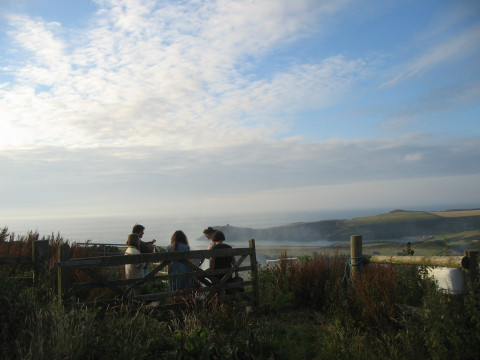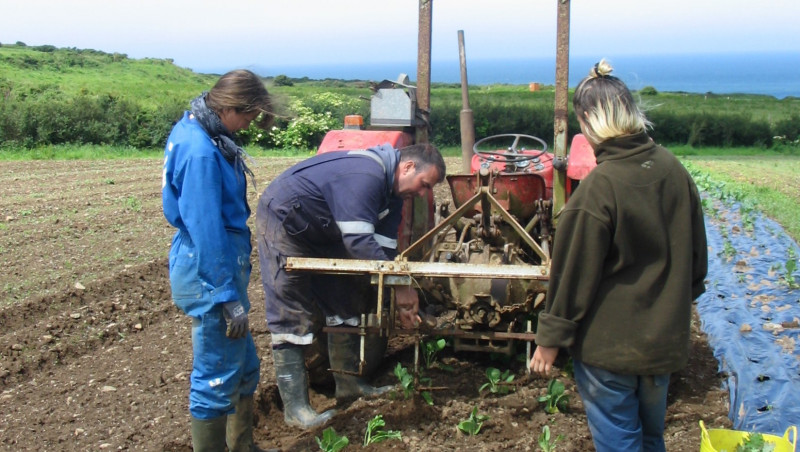“Four weeks ago I left my ordinary Dutch life to give it a try: working on a remote organic farm in Wales and work on a sustainable food system. I knew I was going to learn a lot of new things but I didn’t know I was going to have so much FUN!!” – Tosca Boot, Agri-Activist volunteer 2017
Every summer, we pair up four volunteers for placements on a beautiful, community-supported, organic, family farm in Wales. But this isn’t ordinary WWOOFing – it is a two-in-one opportunity, during which you will tackle the problems of our current food system and work towards sustainable solutions.
The farm is run by Gerald Miles, a prominent campaigner who has been at the heart of the anti-GM movement in the UK for decades. Volunteers get hands-on experience in working on an organic farm rooted at the heart of a local community and get involved in planning and delivering campaigns to make the local area herbicide- and pesticide-free, as well as raising awareness about the risks of GMOs in agriculture.
When: 2-3 months in summer 2018. Placements will run over two periods: either May-July or July-September. There is some flexibility in dates, let us know your availability in your application.
Where: Caerhys Organic Farm, Pembrokeshire, South Wales
Cost: YFoEE will cover your travel, accommodation and food costs. This project is generously supported by a donation left in the will of Helen Holder, a brilliant environmental activist who worked for many years with both Gerald Miles and Friends of the Earth Europe.
Who are we looking for: Young people between the ages of 18 and 30, passionate about sustainable food and looking for experience of sustainable farming and campaigning against herbicides, pesticides, GMOs and other forms of unsustainable agriculture.
Find out more about this placement and life on the farm through previous volunteers’ blogs and photos!
Find out more about family farms in the UK by watching this film (password: FOOD).

How to apply:
Send a letter of motivation to kwhitaker@foe.scot by 5pm CET on Friday 16th February 2018 detailing:
- Your motivations for applying for this placement and what you hope to gain from it
- In your own words, what is wrong with the current food system and how we can work towards fixing it
- Your previous practical experience with (sustainable) agriculture and/or campaigning experience
- Other experience with social, environmental justice or community organisations
- Your availability in summer 2018 and preferred timing of placement
Personal statements can be in written, video or audio format. Feel free to be creative!
Please also include one reference if possible.
We encourage applications from people of any ethnic, social and religious background, sexual orientation and gender identity. We particularly encourage applications from people who are or who feel under-represented in the environmental movement.
The local languages are English and Welsh, and campaigning will be done in English, but participants are not expected to be native speakers. Unfortunately, we are only able to fund travel from within Europe. Selection of participants will be in part based on YFoEE’s principles of intersectionality.
Successful applicants will be contacted by the end of Feburary, and we will work with you (by email and skype) to prepare your participation in the project.
We look forward to receiving your application!
Placement details:
Goals and structure of placement
This placement has two main goals:
- To train young people on environmental campaigning and activism (knowledge, skills and empowerment)
- To provide them with the opportunity to experience sustainable agriculture
Structure and tasks of placement:
- Farm work: Volunteers are expected to spend about 40-50% of their weekly working time (12-15 hours per week) on farm-related tasks: weeding, harvesting, sowing seeds and transplanting in the fields or greenhouses, clearing field areas, distributing the produce in the members’ boxes and more. In short, you will get your hands on everything, which is the best way to understand how modern organic farming is done.
- Campaigning and activism: about 50% of your working time (up to 15 hours per week) is to be devoted to campaigning. That may involve strategizing (along with Gerald and the other agri-activists), working on campaigning materials (posters, flyers, online materials, presentations), researching and reading, networking, even participating in local actions.
- Other: Up to 10% of your time (3 hours per week) may be distributed acorss other tasks. This may be communication with the YFoEE Food and Agriculture Working Group, blogging for the YFoEE website, other tasks around the farm or contributing to planning and running events on the farm.
- In total participants work for approximately 30 hours per week. Mentoring may take place outside ordinary work hours. Flexibility of working schedules is required for the campaigning side of the placement.
Logistics
- Farm work is led and supervised by the farmers and other responsible volunteers. You will work with other volunteers (mostly from WWOOF International, but also from other voluntary services) and of course with the other YFoEE agri-activists.
- Support: Gerald Miles is responsible for the stay and work of the agri-activists. YFoEE will be the main external contact point during the placement. They may provide input, such as resources and guidance if necessary.
- Accommodation and Meals: During the project, you will be staying in a static caravan and sharing with one other participant most of the time (individual bedrooms). Electricity, gas and water are included in accommodation. You will also have access to a simple bathroom with a shower. Caerhys farm will provide you with free organic vegetable share and will cover your other food costs. Volunteers are expected to look after themselves and cook their own food.
Learning
The main benefit of the stay and work at Caerhys farm as an agri-activist is the learning and experience relating to the following aspects:
- Farming and modern agriculture: Forms of sustainable farming, organic production and local consumption (CSA, sales to local businesses)
- Community supported agriculture (CSA): Becoming familiar with the business model (how it functions in theory and in practice), connecting with the community’s members, getting a feel of what this CSA means to the members.
- Campaigning and activism: Acquiring experience of local and national campaigning, grassroots activism, local actions, networking with other activists and members of the community. One of the strongest and most unique aspects of this placement is the mentorship that you receive from Gerald as part of the campaigning efforts.
Additional perks
- Meeting like-minded young people who volunteer at the farm
- Stay with other agri-activists in a caravan with an outstanding view in an idyllic location.
- Beaches, walking paths, coastal sports and activities in the vicinity.
- Enjoying the unspoiled nature of the St David’s peninsula.
- Your share of fresh organic vegetables every week.
- Becoming part of the community during your stay
- Networking in Pembrokeshire and getting to work with an international environmental organization.
- Fun. During work, after work, during campaigning, when going out with other volunteers and Gerald. It is all a fun adventure!

